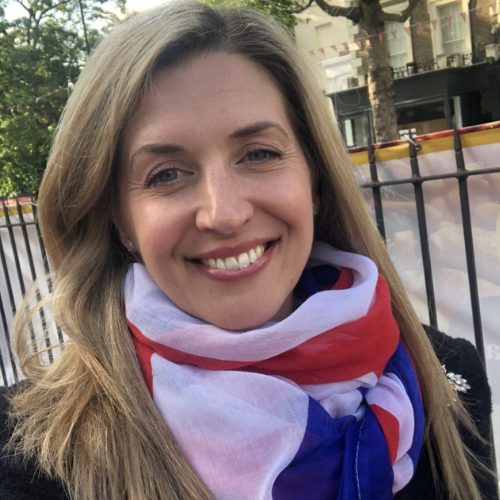
Meet the Expert: Kate McCullough
Welcome to 'Meet the Expert', our news series that brings you informative interviews with Armed Forces researchers, policy makers, and service providers. Read on to learn about current work, aspirations for progress and future work, and insights into expert perspectives on key issues impacting the Armed Forces community.
 In this issue, we interviewed Kate McCullough, Director of Operations at Cobseo, The Confederation of Service Charities, which works to support the needs and opinions of its member organisations, at central and local government levels and works with its members to further the interests of the Armed Forces community.
In this issue, we interviewed Kate McCullough, Director of Operations at Cobseo, The Confederation of Service Charities, which works to support the needs and opinions of its member organisations, at central and local government levels and works with its members to further the interests of the Armed Forces community.
1. Please tell us about your background and how you came to be involved in work relating to the Armed Forces community.
I have been part of the Armed Forces community for about twenty years through my husband, who is a Serving Army officer. After maternity leave for each of our two children, I did fixed-term roles at the Army Families' Federation (AFF), which gave me an understanding of the issues faced by the community and how to work with policy makers to affect change. My second role with AFF was a collaborative research project with the RAF and Naval Families Federations, which helped me understand the lifestyles, issues, and opportunities across the Services beyond the Army.
2. What projects are you currently working on, and how do they fit into the bigger picture of understanding and supporting the Armed Forces community?
At Cobseo, we are working closely with colleagues in the Ministry of Defence (MoD) People Team and Office for Veterans' Affairs (OVA) to inform and influence the development of the Veterans Strategy and VALOUR on behalf of our members. It's important to us that both initiatives are evidenced-based and take the views and expertise of the sector into account. For the sake of the Armed Forces community, we want to facilitate meaningful dialogue with policy makers so that our members feel they have a voice, and the Strategy and VALOUR are as effective as they can be. We are also working closely with the MoD teams responsible for the routine, prudent planning of scalable Reception Arrangements for MoD Personnel (RAMP). This collaboration is in recognition by the MoD and NHS that the charity sector will need to play an integral role should the scalable RAMP plans ever need to be deployed.
3. What other areas and issues relating to the Armed Forces community are you especially passionate about or feel need further attention? Please expand on this and tell us about them as much as you can.
The Armed Forces Covenant remains a really important part of our sector. We have contributed to the discussions around the extension of the scope of the Covenant and brought members' views to Government and Parliament. There remains lots of questions around the metrics and assurance mechanisms that will accompany the extension of the Duty and I think we need to get some clarity on these important areas if the Covenant is going to reach its full potential, and to ensure that we don't sleepwalk into advantage for the Armed Forces community versus tackling disadvantage as the Covenant is intended. I feel passionately about ensuring that the community can access what it is eligible for in a way that works for them, but I recognise this has to be fair when compared to those from other parts of society that aren't linked to the military.
4. What are your future aspirations for the impact and utilisation of your or your organisation's wider work?
I am looking forward to developing plans for Cobseo for 2026 and beyond that, further enhancing the value of Cobseo membership, so that members get as much as they can from being part of the Confederation, and so that the Confederation adds really meaningful and sustainable value to the sector. Cobseo's focus is broad and varied, as illustrated by the Clusters and other interest groups that we facilitate, and the range of subject-specific support and guidance that we provide to members. I look forward to building on that and refining it yet further by learning from best practice outside of Cobseo and our sector, and listening to members' feedback.
5. What do you think are the key challenges impacting current ex-Service personnel and their families, and how do you think policy or provision of services can be best used to address them?
In my previous role at MoD, much of my focus was on transition. Most people leave the military well, but the complexity of challenges some face can be considerable and isn't always as a result of Service life specifically. I think MoD and the single Services need to be bolder in how they embrace the findings of various reviews and previous research, and indeed policy, before now and invest more in through-career education, "life skills", if you will. I can appreciate the reluctance to make time and space for things that can be misinterpreted as encouraging people to leave the military or detract from activities that support operational effectiveness, but we need to change the mindset about this – it's about helping people to help themselves and being a responsible employer; doing both of these things will ultimately benefit the military in terms of numbers and effectiveness. I wonder if we need to move away from the language of "transition" because of the contradiction this appears to create with retention, and find a better way to 'make the most of life' whilst serving and in so doing, preparing for life after Service, whenever and wherever that may be for everyone.
6. What do you think will be the leading challenges for the next generation of ex-Service personnel, and how do you think policy or provision of services can be best used to address them?
I think the perceptions of ex-Service personnel, and how they are valued by wider society, will affect civilians' support of our community and acceptance and patience for things like the Covenant Duty. Government is in the optimum position to affect this on a wholesale basis, and I am excited to see how the focus of the next Veterans' Strategy will affect this, but we all have a part to play. Whilst I recognise the tension between articulating the community's needs in order to garner fundraising and other support for service providers, we all have a responsibility to ensure that messaging is accurate and current and focuses attention and support in the right areas where it is needed.
7. Can you tell us about your favourite part of your current work with the Armed Forces community and why?
I really enjoy my Cobseo role! It is a privilege to work with my team colleagues, and I am very motivated by the direct link between our efforts and positive changes to opinion, policy change, or service delivery. It is a joy to have the energy and autonomy as an organisation to identify an issue, learn from the evidence, and then respond. Another favourite aspect of my role is listening to and learning from our members. The variety of issues we cover is vast, and it's truly motivating to be around people who are so dedicated to what they do and the communities they serve. Alongside my day job at Cobseo, I am also a Director of the Forces in Mind Trust, where I enjoy bringing relevant experience from within the same sector and the different mindset that being a Trustee demands. I feel very lucky to work with another hugely committed and expert executive team and my fellow trustees, who come from all sorts of industries and backgrounds.
8. Given unlimited funding and time, what would be your dream project to undertake involving the Armed Forces community?
The perennial topic of data is really important to me, and it's noteworthy that it is a distinct part of the VALOUR plans. We have been talking about how to 'do' data better for a long time as a sector, and just don't seem to be able to crack it, probably because of disparate priorities, limited resources, and a touch of protectionism in some parts of the sector. I think we need a central strategy that we co-create and can all lean into, defined by simple, realistic inputs that catalyse focused, meaningful outputs and impact through policy and service delivery. I recognise previous Cobseo-led work on the Data & Research Working Group that may need to be reinvigorated.
I would like to see a more aligned approach to client casework too, in order to realise latent value and more efficiencies from within the sector and ultimately to improve outcomes for beneficiaries. I think we could collectively affect some really powerful change if we could bring various approaches to casework assessment, interventions, data capture, analysis, and reporting together. This isn't a new idea, completely, and there is some work in train in different places looking at different aspects, but the real power would be in a truly collaborative effort.
Many thanks to Kate McCullough for sharing her insights.
Catch us next month for another interesting and informative interview with an expert from the Armed Forces community.